
People want three things from work: money, meaning and magic. Money feeds the stomach. But meaning and magic feed the spirit and the soul.
A person needs enough money to get the basic materials for life. They may then need other things to get the right blend between their wellbeing, meaningful work and wealth.
Looking back, can you think of a time when you did work that gave you enough money and had real meaning? Sometimes you may also have experienced a sense of magic.
Here is a précis of what three people I have worked with for many years said when exploring this theme.
“When I worked as a volunteer for six months in a refugee camp. We had little money, but it was enough. The conditions were raw but I felt so alive. Every day was a chance to help refugees to recover from illness, be reunited with their loved ones or find a home in a new country.”
“When I worked on an IT project for the Commonwealth Games. It was inspiring to work towards a goal that would help the Games to succeed. The team was full of energy and applied their skills to deliver outstanding results.”
“When I led a team that created a new culture in a growing part of a business. The company allowed us to make the culture fit for the future rather than follow old methods. It was exciting and people learned many lessons they applied in their future careers.”
Money
Different people have different relationships with money. Sometimes their attitudes are shaped by their experiences growing up in the family.
Some individuals decide to change their attitudes about money. One person I worked with took this approach. He described this in the following way.
“I grew up in a working class family where we lived on the never-never. My parents always made sure we had enough food but they always stretched themselves financially.
“After paying off one debt they immediately bought something else from the home catalogue. At one point my father also got into gambling and thought he could pay off everything with one big win.
“I have changed my own attitude to money. At one point I thought I would never have enough. I also recognised I would never get a big pot of gold – such as by starting and selling a company.
“This was a key turning point – realising that I would need to earn money for much of my life. Building on what I did best, I developed transferable skills that would be required in both the present and future world.
“Whilst it is impossible to predict the future, I will always be able to make a contribution that helps my customers to achieve success. This will hopefully continue to provide a good income stream.”
Different people want money for different reasons. As mentioned earlier, these include the following:
To get the basic materials for life – food, shelter, health care and other necessities – and follow their chosen lifestyle;
To build a financial fund that can protect them in tough times, provide health care for their later years and give their children a good start in life;
To gain a sense of freedom and feel they can shape their future in the way they want.
If you wish, try tackling the exercise on this theme. Looking at your own work, this invites you to do the following things. Describe the extent to which you feel you have enough money in your work. Rate this on a scale 0 – 10.
Many individuals will say they would like more money. This will certainly be the case if they cannot afford the basic materials for life. Some people may be able to make changes in their lifestyles, however, that mean they can live on less money.
Describe the specific things you can do to maintain or improve the rating. This could include aiming to earn more, adjusting your lifestyle, finding another role, developing another income stream or doing other activities.
Meaning
Many people want a sense of meaning in their work. They often do their best work when they have the opportunity to do the following things:
They pursue a compelling purpose and aim to achieve a specific goal;
They use their strengths to follow principles they believe in and get the support they need to do the job;
They perform superb work, are managed by outcomes – rather than by tasks – and do their best to deliver the desired picture of success.
Different people choose different ways to focus on these themes. Here are some of the routes they take.
Some people want their employers to provide a compelling vision. This approach can work when there are leaders and employees who continually commit themselves:
To get wins for the organisation, wins for the customers and wins for the colleagues.
In some organisations, however, the leaders may be battling to hit the next month’s targets or manage their own backers. This can lead to short-termism. People can find themselves buried in doing grunt work without the chance to do great work.
Some leaders take a different approach to enabling their people to do meaningful work. They encourage them to deliver the scorecard – the mandatory things that must be done – and also doing stimulating projects.

Every organisation has its own version of a scorecard. Some scorecards mainly focus on the What and the targets are written in outcome terms. People are given freedom, within parameters, regarding how they deliver these results.
Some scorecards describe not only the What, but also have strict controls on the How’ The centre wants to feel more in control – not only of what people deliver, but how they do it in their daily work.
One leader I worked with helped her team to do satisfying work whilst also delivering the team’s targets. She explained this approach during an off-site two months before the beginning of the new financial year. Here is how she positioned this approach.
“The scorecard has changed as our business has got bigger. Ten years ago it contained a few top line targets. These covered the normal Three Ps of Profits, Products and People.
“We had lots of freedom in terms of how we worked to hit these targets. But during the past few years the scorecard has contained more and more micro-targets.
“Some people get upset about the scorecard. But, as I say to the people who join my team, we have several choices. We can choose:
To ignore the scorecard;
To fight the centre about the scorecard;
To grumble about the scorecard and let it dominate our lives;
To move elsewhere;
To deliver the scorecard – but in a way that is creative – and also do stimulating projects that provide wins for ourselves and for the business.
“I tell the people who join my team that we are going with final option. We can then keep the centre off our backs and create the space to do other good work.
“If people don’t want to do that – if they just want to do the things they find interesting without delivering their part of the scorecard – they should find another team.
“I have earlier had conversations with each of you. Everybody wants to contribute to delivering the scorecard whilst also doing satisfying work. So let’s look at how to deliver the results.”
The leader then invited each person to focus on the following themes. Bearing in mind their strengths, they were invited to describe the specific things they would like to do:
To help to deliver the scorecard and satisfy their key stakeholders;
To do stimulating projects that would also benefit the business;
To translate these projects into success stories that could be published and deliver benefits for the company.
The team members made clear contracts about the outcomes they would each deliver in the next financial year. During the following twelve months they fulfilled these contracts and delivered the goods.
The organisation’s management style became increasingly oppressive, however, and led to many respected knowledge workers leaving the business. This included the leader who took a prestigious role in another company.
Some individuals take another approach to doing meaningful work. They follow their vocation, find the right vehicle and do valuable work. They may choose to do this by aiming:
To find or create a role in an organisation where they can do satisfying work that helps people to achieve success;
To be a professional freelancer who helps individuals, teams or organisations to achieve success;
To build a business that helps its customers to achieve success.
If you wish, try tackling the exercise on this theme. Looking at your own work, this invites you to do the following things.
Describe the extent to which you enjoy a sense of meaning in your work. Rate this on a scale 0–10. Describe the specific things you can do to maintain or improve the rating.
Magic
When do you experience a sense of magic in your work? When do get creative breakthroughs? When do you feel joy or a deep sense of satisfaction?
Some people feels these when doing work that involves the heart, head and hands. They are immersed in the activity and at one with the work. Things come together and they feel a higher harmony.
Some people get these feelings when managing a crisis. They feel it is a privilege to be able to use their strengths in pressure situations. Pursuing their chosen strategy, they then do their best to achieve success.
Some people get the helper’s high by doing work that helps other people to succeed. Bearing in mind Maya Angelou’s famous quote, they want to help people and give them a positive memory for life.

Different people describe these experiences in different ways. Here are some of the things they say. These are based on people I have listened to or with whom I have worked.
“I feel happy and relieved when seeing a recovered patient leaving hospital. Sometimes the whole staff line the corridor and applaud them as they go out of the door with a wave. The feeling of exhilaration reminds me of why I came into this work.”
“My greatest satisfaction comes from seeing a young footballer I have worked with make their debut in the senior team. There is a saying in Academies that: ‘Our trophies are the players who become regulars in the first team’. We now have five graduates in the first team and this gives me great pleasure.”
“I get an enormous kick from seeing the relief on a customer’s face after fixing their technical issues. They sometimes greet me as if I am a paramedic who is a saviour. It is great to use my skills to solve their problems and help them to succeed.”
Some people often enjoy a sense of magic in their work. Such people enjoy the journey as well as reaching the goal. Some people experience this feeling on less frequent but intense occasions. They feel high after overcoming a challenge or reaching a stimulating goal.
If you wish, try tackling the final exercise on this theme. Looking at your own work, this invites you to do the following things.
Describe the extent to which you experience a sense of magic in your work. Rate this on a scale 0–10. Describe the specific things you can do to maintain or improve the rating.


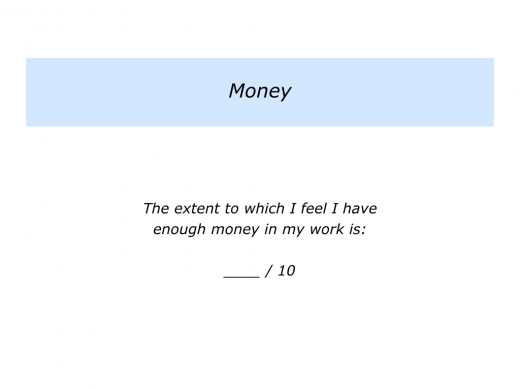
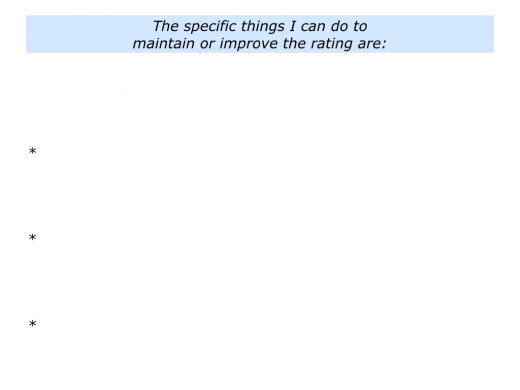
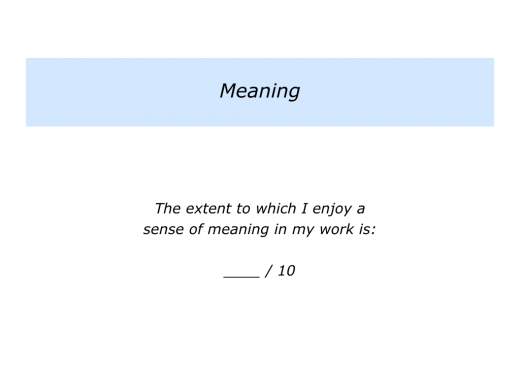
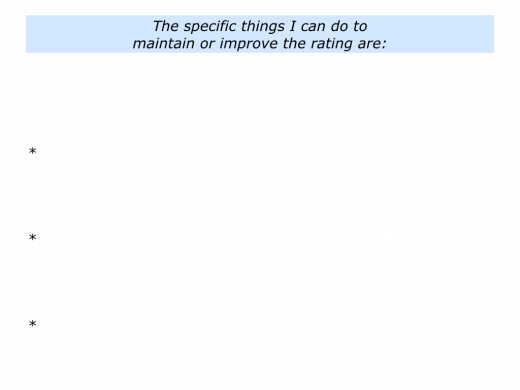
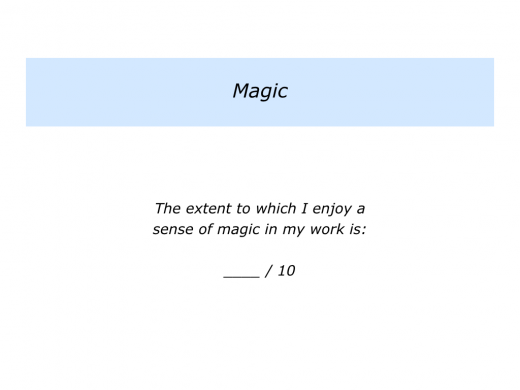
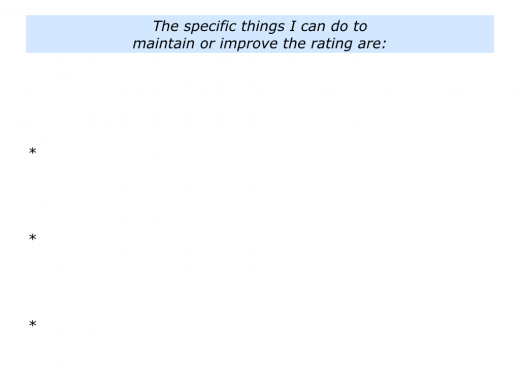
Leave a Reply